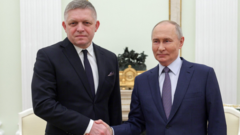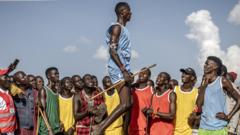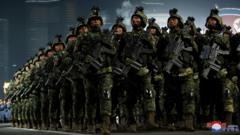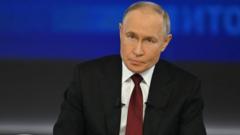The recent military collaboration between Russia and North Korea underscores significant geopolitical shifts, as both nations enhance their military capabilities while addressing mutual threats.
Russia's Antiaircraft Missile Supply to North Korea: Implications and Insights

Russia's Antiaircraft Missile Supply to North Korea: Implications and Insights
South Korea's national security adviser reveals the exchange of military support between Russia and North Korea amidst escalating tensions on the Korean Peninsula.
In a significant development reported from Seoul, North Korea has received antiaircraft missiles from Russia, correlating with the deployment of North Korean troops to aid Russia in its ongoing conflict in Ukraine. South Korea’s national security adviser, Shin Won-shik, disclosed that approximately 11,000 North Korean soldiers have joined Russian operations in its Kursk region, aimed at reclaiming areas occupied by Ukraine. This partnership has reportedly involved North Korea supplying Russia with around 20,000 containers of various weaponry since the summer of 2023, including artillery, short-range ballistic missiles, and multiple-launch rocket systems.
In exchange for military support, North Korea is looking towards Russia to assist in modernizing its armed forces and advancing its nuclear capabilities. A notable point in this military relationship is North Korea's outdated air defense system, which has come under scrutiny given the sophisticated military assets of the U.S. and its allies, particularly the advanced F-35 stealth fighters. Mr. Shin emphasized that the provision of antiaircraft missiles from Russia aims to bolster North Korea's air defenses.
These developments occur alongside Kim Jong-un's aggressive posturing against the U.S. and South Korea, with recent statements highlighting an unprecedented risk of nuclear war, attributed to what he describes as Washington's hostile strategies. The collaboration also extends to advancements in North Korea’s satellite-launch technology, with speculation surrounding Russia’s involvement after North Korea’s first spy satellite was successfully launched late last year, despite earlier failures.
As the situation evolves, the military alliance between Pyongyang and Moscow raises concerns about regional security dynamics and could have far-reaching consequences for U.S. policies and the balance of power in East Asia.
In exchange for military support, North Korea is looking towards Russia to assist in modernizing its armed forces and advancing its nuclear capabilities. A notable point in this military relationship is North Korea's outdated air defense system, which has come under scrutiny given the sophisticated military assets of the U.S. and its allies, particularly the advanced F-35 stealth fighters. Mr. Shin emphasized that the provision of antiaircraft missiles from Russia aims to bolster North Korea's air defenses.
These developments occur alongside Kim Jong-un's aggressive posturing against the U.S. and South Korea, with recent statements highlighting an unprecedented risk of nuclear war, attributed to what he describes as Washington's hostile strategies. The collaboration also extends to advancements in North Korea’s satellite-launch technology, with speculation surrounding Russia’s involvement after North Korea’s first spy satellite was successfully launched late last year, despite earlier failures.
As the situation evolves, the military alliance between Pyongyang and Moscow raises concerns about regional security dynamics and could have far-reaching consequences for U.S. policies and the balance of power in East Asia.





















